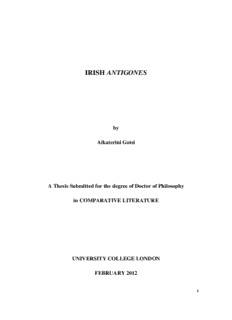
File - UCL Discovery - University College London PDF
Preview File - UCL Discovery - University College London
IRISH ANTIGONES by Aikaterini Gotsi A Thesis Submitted for the degree of Doctor of Philosophy in COMPARATIVE LITERATURE UNIVERSITY COLLEGE LONDON FEBRUARY 2012 1 ABSTRACT This thesis examines the reception of Sophocles’ Antigone in Ireland from 1984 to 2004, in the light of the social and political developments that took place in the country during that period. Chapter 1 examines the textual elements of translation, as well as the different ways in which the mythic element of the tragedy and the characterisation are ‘translated’ in different versions. Chapters 2-4 explore particular dimensions of contextual significance: politics, religion, gender. Each chapter first offers a brief discussion of the relevant Irish circumstances, comparing and contrasting them with the socio-political context of Sophocles’ Athens. Then, it examines the extent, the degree and the different ways in which the translations reflect and engage with aspects of the writers’ contemporary reality. Chapter 5, finally, deals with the scenic representation of the plays as a different and complementary aspect of translation, looking at the degree and the ways in which the different stagings reflect the Sophoclean play, the translations in question and the larger social and political contexts of adaptation. Antigone proves to be a remarkably flexible medium for the expression of strikingly different social and political agendas over time. Overall the thesis finds that, while the writers of the earlier versions reflect through the Sophoclean tragedy the turbulent Irish society of the early 1980s, the writers of the turn of the millennium, living in a globalised era, and with a more settled Ireland, locate the reworking of the myth within a more international outlook. It argues however that the 2 reworkings of Antigone produced in 1984 by Aidan Mathews, Tom Paulin and Brendan Kennelly - despite the significant differences between them - are more adventurous treatments of the original play than the ones produced later, between 1999 and 2004, by Declan Donnellan, Conall Morrison and Seamus Heaney. The thesis concludes that the new readings of the Antigone myth in Ireland after 2004 suggest that the potential of Sophocles’ tragedy within its Irish context is not exhausted yet. 3 Stories travel and stories stay. Stories cross boundaries and frontiers, settle in different places, and then migrate to or colonize other places. They resurface in different places at different times, preserving their ability to entertain, to enlighten and to bewitch. Yannis Gabriel1 1 Gabriel (2004:1). 4 To my parents 5 TABLE OF CONTENTS ABSTRACT………………………………………………………… 2 TABLE OF CONTENTS…………………………………………… 6 ACKNOWLEDGMENTS………………………………………….. 11 INTRODUCTION…………………………………………………… 15 Greek Myths in Ireland………………………………………..………. 17 Antigone in the Modern World………………………………..………. 21 Antigone in Ireland…………………………………………….………. 23 Aims…………………………………………………………………… 27 Sources and Methods………………..………………………………… 29 1. VIOLENT WORDS, VIOLENT DEEDS: TRANSLATING ANTIGONE IN IRELAND AT THE TURN OF THE TWENTIETH CENTURY ……..…. 33 Negotiating the Text…………………………………………………... 36 I. WORDS…………………………………………………… 43 From Colloquialisms to Violent Words…….………………………… 53 6 From Violent Words to Violent Images……………….…………….. 56 II. MYTH…………………………………………………… 60 III. CHARACTERS…………………………………………. 72 Antigone - Ismene……………………………………………………. 75 Creon - Antigone …………………………………………………….. 84 Minor Characters……………………………………………………… 89 Eurydice……………………………………………………………….. 93 2. “ODDLY RELEVANT TO THESE UNCERTAIN TIMES”: ANTIGONE AND IRISH POLITICS, 1984 – 2004……………. 97 Sophocles’ Antigone and Politics……………………………...……… 101 The Burial of the Dead and its Political Implications in Ireland……… 108 Antigone in Ireland and Politics……………………………………….. 113 Defining Politics………………………………………………………. 121 Changes in Irish Politics and Society, 1984 – 2004…………………... 128 I. EARLY VERSIONS………………………………………….. 135 Parochial Colonialism…………………………………………………. 135 Interest in Domestic Politics…………………………………………... 140 The Failure of Politics ………………………………………………… 146 7 Belief in Man’s Potential - Call for Disobedience…………………….. 161 Antigone's Insistence on Personal Duty, despite Consequences……… 174 Ismene’s Dangerous Neutrality……………………………………….. 176 II. LATER VERSIONS……………………………………… 181 From Parochial Colonialism to Global Colonialism…………………... 181 Return to Politics……………………………………………………… 188 3. ANTIGONE AND RELIGION IN IRELAND ……………... 192 Religion in Sophocles’ Athens………………………………………... 195 Religion in Ireland…………………………………………………….. 199 Religious References in the Irish versions of Antigone ……………… 205 Conall Morrison’s Antigone…………………………………………… 210 Tom Paulin’s The Riot Act…………………………………………….. 212 Aidan Mathews’ Antigone…………………………………………….. 215 Brendan Kennelly’s Antigone…………………………………………. 240 4. IRISH ANTIGONES AND GENDER POLITICS………… 247 Women in Sophocles’ Time…………………………………………... 249 8 Female Imagery Associated with Ireland…………………………….. 253 Influential Irish Women……………………………………………….. 257 The Social Position and Role of Women in Ireland…………………... 260 Gender Issues in the Irish Translations of Antigone…………………... 264 Language and Gender………………………………………………… 265 Brendan Kennelly’s Antigone………………………………………… 269 Conall Morrison’s Antigone………………………………………….. 284 5. FROM THE PAGE TO THE STAGE: SCENIC REPRESENTATIONS OF THE IRISH ANTIGONES……………. 286 Studying performances………………………………………………... 290 I. SET AND COSTUMES…………………………………... 296 Michael Scott’s staging of Mathews’ Antigone (1984) ……………… 303 Lorraine Pintal’s staging of Heaney’s The Burial at Thebes (2004) … 308 Stephen Rea’s staging of Paulin’s The Riot Act (1984)………………. 311 Conall Morrison’s staging of his Antigone (2003)……………………. 313 Patrick Mason’s staging of Heaney’s The Burial at Thebes (2008)….. 316 9 THE CHORUS……………………………………………..………… 317 I. THEME AND ACTION…………………………………. 328 Conall Morrison’s Antigone…………………………………………… 329 Patrick Mason’s The Burial at Thebes………………………………… 332 Lorraine Pintal’s The Burial at Thebes………………………………... 336 CONCLUSION………………………………………………………. 341 BIBLIOGRAPHY…………………………………………………… 343 10
Description: